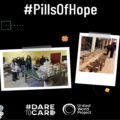
Workshop
Greening music
Bands, singers and whole festivals are changing their ways of thinking about concerts and live music to reduce their environmental impact. Is it the start of a lasting change for an industry that every year produces tonnes of waste and large carbon dioxide emissions?
Many international bands are already doing something for the protection of the environment: Pearl Jam, Green Day, Linkin Park, Dave Matthews Band, Muse, to name a few. Some finance environmental organisations or foundations, others raise awareness for the protection of the environment, recycling or sustainability. The band that is really ahead of the curve is Coldplay. The British band is making unprecedented progress in the way they conceive music and concerts.
In November 2019, Coldplay launched its new album via two live shows streamed from the summit of the ancient Amman Citadel, in Jordan. They performed in a concert at dawn and another at sunset, playing songs from the two parts of their new double album: “Sunrise” and “Sunset”. Why in Amman? Because the most popular bands do not normally launch their songs in the Middle East, they do not even include countries from this region in their tours. Therefore, the band led by Chris Martin seized the opportunity to increase the visibility of these places that have been forgotten by the music industry.
Coldplay’s initiative marks a change of course in the band’s history. Their new album, “Everyday Life”, strongly criticises the lack of empathy, both worldwide and individually, for several global issues which remain unresolved: the refugee crisis (“Daddy”), systematic racial discrimination (“Trouble in Town”), the distress of living in a war zone (“Orphans”), among others.
The cherry on the cake was the announcement made at the end of the launch of “Everyday Life”: “We are not touring this album”. Six simple words that go against the global music business. Because, as Chris Martin explained to the BBC: “Our next tour will be the best possible version of an environmentally-friendly tour. We would be disappointed if it wasn’t carbon neutral. Our dream is to have a show with no single use plastic bottles, and to have it largely solar powered”.
After this announcement another British band, Massive Attack, and the singer Billie Eilish, joined the initiative to make their concerts “as green as possible”.
Last summer Jovanotti, one of the most famous and most popular Italian singers, began a revolutionary tour, launching his new album in the form of one-day festivals on the beaches of the Italian coast. The most impressive thing, besides the imposing and grandiose staging, was his commitment to the protection of the environment.
All of the beaches included in his tour – as well as the one in Kronplatz, a plateau at 2300m in the Dolomites – were almost spotless at the end of his shows. The positive visual shock was the result of effective waste management by means of many “ecological islands” which held recycling facilities for paper, metal, organic waste, plastic – including single-use plastic bottles – and general rubbish. Volunteers from various environmental organisations carried out the initiative.
The audience is changing, the artists are changing… Festivals are changing
When it comes to concerts, one of the main contributors to carbon emissions is transportation: carrying a band, their equipment and the thousands who attend the concerts. Not to mention the energy supply needed to put on these shows: to power the sound, the dazzling lights, the –excessive? – devices and tricks needed to make the artist enter on a flying car or to make it rain on stage, to name but a few of the countless visual effects that cost millions and damage our natural surroundings.
However, little by little, the logic of these gigantic events is changing. Glastonbury, for example, the biggest music festival in the world, has taken its first small but necessary step: banning the sale of single-use plastic during the shows. Other festivals are introducing the use of LED lights, which last longer and consume less energy. Some bands are building their stages out of recycled plastic and some are going even further, powering their shows partially or, in some cases, exclusively with solar energy.
These are just some of the steps that are catching on and becoming necessary in the music industry. However, the last and perhaps most important link in the chain concerns us all: only the audience can set the pace for change. We can start with simple actions, like bringing our own water bottles to avoid the use of disposable glasses and plastic bottles, or using public transport to travel to the city of the event and the venue itself.
A big change is underway. The music industry’s care for the environment is not just appreciated, it is required, and it begins with the contribution of each individual participant, whether is on or off-stage.






